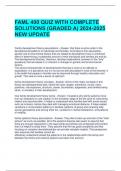FAML 400 QUIZ WITH COMPLETE
SOLUTIONS (GRADED A) 2024-2025
NEW UPDATE
Family development theory assumptions - Answer- that there is some order in the
developmental patterns of individuals and families. According to this assumption,
genetic and environmental factors that are related to development have a combined
effect in determining a substantial amount of what individuals and families are and do.
The developmental theories, therefore, develop explanations (answers to the "why"
questions) that are based in or inherent in changes in genetic and environmental
factors.
The second characteristic of developmental theories is more of an attitude or
expectation. It is pervasive, but it is not as not well articulated in most of the theories. It
is the belief that people or families can be improved through healthy maturation and
growth. This view is more a sense of optimism
family development theory concepts - Answer- Some of the major concepts in this
theory are developmental task, family life cycle, stages, transitions, norms, roles,
positions, role sequence, structure, career, boundaries, epigenesis, and families being
stuck, or arrested, in their development.
how family development theory works - Answer- It explains why family systems move
from an emphasis on rule creation in the formation stage of the life cycle to rules being
implicit and assumed later. It helps us understand why families deal with some issues,
such as inclusion, before they deal with managing emotional distance. It helps explain
variations in consumption patterns in families, patterns of giving and receiving help
across generations and among other kin, variations in marital satisfaction, and patterns
of mobility.
family systems theory assumptions - Answer- They like to back up and look at the "total
picture" as much as possible. All of the systems theories also seem to assume that
there are enough regularities in the ways parts and wholes are composed and function
that it is helpful to study them. They assume that life has great complexity and that
focusing on complex interrelationships can provide valuable insights. This perspective
also assumes that families cannot be
effectively understood unless the patterns in the relationships within the family and
between the family and external systems are taken into account.
, family systems theory concepts - Answer- Many of the concepts in family-systems
theory are the same as in general systems theory—for example, terms like input,
output, feedback, rules of transformation, and boundaries. In addition, however, a
number of concepts are primarily limited to the family-systems theory: individuation,
mystification, paradoxical bonding, double bind, complementary and parallel
relationships, metacommunication, rules and metarules, boundaries, openness,
pseudomutuality, coalition, and triangulation.
how family systems theory works - Answer- This theory was designed by and for
practitioners who wanted to make a difference in the quality of family life. Therefore, it
tends to be a pragmatic theory, and it is extensively used in the field.
exchange theory assumptions - Answer- Humans seek rewards and avoid punishments.
▪ Humans are rational beings.
The standards that humans use to evaluate costs and rewards vary over time and from
person to person.
exchange theory concepts - Answer- rewards is the first concept, and with rewards, we
mean anything that somebody sees as positive. Those can be material rewards, those
can be non-material rewards. Costs—anything that we don't like. You know, Brussels
sprouts, if we stick with the vegetable analogy. So we can have—a cost can be a
punishment, or a cost could be not getting a reward that we expected to get. So the
profit, then, is really the rewards minus the cost and that's it. Rationality-- But what this
theory is talking about is that rational people, two people that are rational thinkers, could
be put in the exact same situation with the exact same potential rewards, the exact
same potential costs, and both people—because they're rational—will make the same
decision. A rational decision is the decision that gives us the most profit. Reciprocity--
That's kind of the "I'll scratch your back if you'll scratch mine." We like things to be
equal, and if people give to us, we feel obligated to give back to them, or we feel like we
should not injure people who do good things to us.
how exchange theory works - Answer- The most extensive application of social
exchange has been in the area of interpersonal relationships.[14] However, social
exchange theory materializes in many different situations with the same idea of the
exchange of resources. Self-Interest can encourage individuals to make decisions that
will benefit themselves overall.
critique of developmental theory - Answer- This theory is one of the narrower and less
general theories in family science. It is less general in that it deals with a fairly small part
of the elephant. It is also not widely used in research or application in the field.
Therefore, it is a useful but very limited perspective.
critique of family systems theory - Answer- The systemic perspective has provided
many useful insights, but it also has a number of important limitations. The scholars who
developed this perspective ignored gender issues and abusive processes in family
systems. For many years the therapeutically oriented scholars also generally paid little





